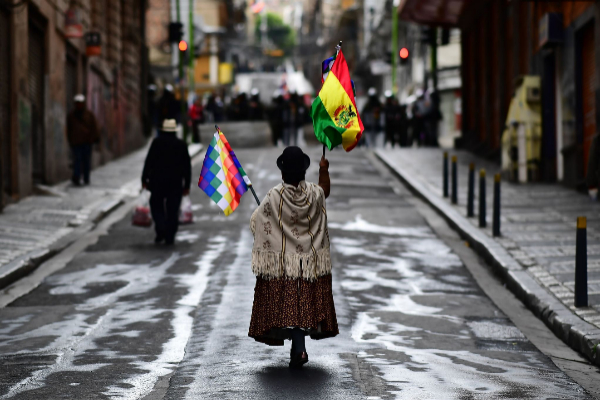- Political crisis Bolivia: the battle of the 'whipala'
- Latin America: Morales' lawyers warn that "Bolivia is outside the international system"
- Incident: The keys to the diplomatic clash between Bolivia and Spain
Bolivia will go back to the polls on May 3 to elect its president and vice president and renew the Legislative Assembly, after the failed elections last October that were annulled, an electoral vowel announced Friday.
The elections will be held "on the first Sunday of May," Bolivia's Supreme Electoral Tribunal (TSE) vocalist Oscar Hassenteufel said briefly to the media in the city of Sucre, the constitutional capital and headquarters of the judicial body of Bolivia.
The call for elections and the electoral calendar will be published next Monday, Hassenteufel added, after attending an act of the Constitutional Court in Sucre.
The president of the TSE, Salvador Romero, confirmed hours later that "on Sunday, May 3, citizens are going to vote to elect the Presidency and the Legislative Assembly."
Romero told the media in La Paz that the details of the electoral calendar will be known in the next few days and that an eventual second round, if necessary, would take place "within a period not exceeding 45 days after the first one" .
Bolivia will hold the new elections after those of October 20 were annulled, in which former President Evo Morales was declared the winner for a fourth consecutive term.
These elections were annulled amidst allegations of fraud in favor of Morales, who on November 10 announced his resignation denouncing a coup d'etat to overthrow him.
A report by the Organization of American States (OAS) confirmed that there were "malicious operations" in the elections of October 20, which altered "the will expressed at the polls."
The previous electoral body that managed those elections ended up being prosecuted, with its members in preventive detention, accused of electoral crimes related to that alleged fraud.
The Bolivian Parliament, in which the party of Evo Morales, the Movement to Socialism (MAS) has the majority, appointed a few weeks ago six new members of the TSE, while the seventh was appointed by the interim president of Bolivia, Jeanine Áñez , which has this power.
A law is also pending, at the initiative of the Senate, to extend the current mandate of the Executive and the Legislative, which concludes on January 22, given the impossibility of holding elections to renew them before that date.
It will be the first election that the MAS will face without Morales as a candidate, something that that party had managed to avoid so far with legal resources that allowed it to stand for the 2014 and 2019 elections despite the constitutional limit of two continuous mandates.
Morales, who is handling his refuge in Argentina, has announced a meeting in Buenos Aires on January 19 to elect the MAS candidates in the elections.
Former president Carlos Mesa, who was Morales's main contender in the October elections, has confirmed that he will run again, while civic leader Luis Fernando Camacho also plans to be a presidential candidate, although for now he has not confirmed with what acronym he will .
According to the criteria of The Trust Project
Know more- Evo Morales
- international
The Evo Morales party will elect its candidate to preside over Bolivia in January
Diplomacy Bolivia declares diplomats and GEOs who went to the embassy "non-gracious people"
OAS Policy, the new ideological battle of America

